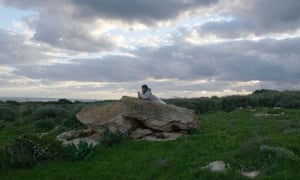In 2013 Gianfranco Rosi won the Golden Lion at Venice with Sacro GRA, a lyrical documentary about – of all things – the buzz of activity around Rome’s ring-road, the Grande Raccordo Anulare. Now Rosi has put his quiet observational skills and judicious sense of shot selection to work on a far more hot-button topic: the Sicilian island of Lampedusa as it battles to contain the flood of migrants attempting the perilous crossing from north Africa in horrifically overcrowded boats.

Italian director Gianfranco Rosi creates an unsentimental documentary about the carnage and despair as Lampedusans struggle to deal with desperate refugees
Rosi’s method is far from strident: there are no hectoring calls to action here. His focus is primarily on the locals: at least, they are the people his camera dwells on, who we get to know in some measure. The migrants, on the other hand, sweep through the film in an unending stream; we are barely able to register a single detail before they vanish and it’s on to the next batch.
Fire at Sea begins with a sequence of a hunting-obsessed young boy, Samuele, cutting a tree-branch for a slingshot; a suggestion, no doubt, of the carnage of the larger drama that is to follow. Without comment, or indeed context of any kind other than that naturally emerges, Rosi embeds Samuele and his family in Lampedusa’s life: there’s the radio DJ, playing lachrymose Sicilian folk songs on request; the fishermen, whose ranks Samuele will join when he grows up, who tell stories of their lives at sea; the doctor who occasionally can have the pleasure of giving a scan to a pregnant migrant, but who more often is examining cadavers dragged up dehydrated from boat holds, or treating kids for chemical burns caused by boat fuel.
As Rosi proceeds, we see more and more of the dreadful process of migrant rescue: the boats, packed to the gills, sending despairing messages as they begin to sink in the rough seas; the patrol boats racing out in the darkness to try and find them; the gruesome cargo of corpses and nearly-dead that must be disembarked before the living.
Rosi contrasts the tough but essentially content settled conditions of the Lampedusans with the terrifying uncertainty experienced by the incomers. (Interestingly, the migrants are by no means confined to Syrian war refugees: everywhere from Eritrea to Nigeria is represented.) The title does triple duty: not only suggestive of the disaster currently unfolding in the Mediterranean, it is also the name of one of those lachrymose songs, and also evokes the memory of the second world war, when flares the navy sent up in the area turned the sea red. This is quiet, unflashy film-making, that nonetheless packs a powerful punch.
Nenhum comentário:
Postar um comentário